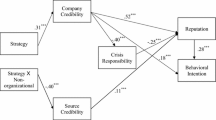Abstract
A cognitive model of crisis theory and data validating the theory are presented. The research is structured in terms of construct validation of a test of crisis behavior. Two hypotheses regarding the crisis test were tested. Hypothesis One states that individuals in situations that typically produce crisis will have a higher crisis score on the test, and Hypothesis Two states that there will be a negative correlation between crisis and defensiveness. Both hypotheses were validated and the meaning of the results and significance for future research are discussed.
Similar content being viewed by others
References
Birley, J. T. L., & Brown, G. W. Crisis and life changes and the onset of schizophrenia.Journal of Health and Social Behavior, 1968,9, 203–215.
Bloom, B. L. Definitional aspects of the crisis concept.Journal of Consulting Psychology, 1963,27, 498–502.
Caplan, G.Principles of preventive psychiatry. New York: Basic Books, 1964.
Cronbach, L. J., Eehl, P. E. Construct validity in psychological testing.Psychological Bulletin, 1955,52, 281–302.
Dahlstrom, S. G., & Welsh, G. S.An MMPl handbook. Minneapolis: University of Minnesota Press, 1960.
Guilford, J. P.Psychometric methods. New York: McGraw-Hill, 1954.
Hill, R. Generic features of families under stress.Social Casework, 1958,39, 206–214.
Lazarus, R. S.Psychological stress and the coving process. New York: McGraw-Hill, 1966.
Lazarus, R. S. Emotions and adaptation: Conceptual and empirical relations. In W. J. Arnold (ed.)Nebraska Symposium on motivation 1968, Lincoln, Neb.: University of Nebraska Press, 1968.
Miller, K. S., & Iscoe, I. The concept of crisis: Current status and mental health implications.Human Organization, 1963,22, 195–201.
Rapoport, L. The state of crisis: Some theoretical considerations.The Social Service Review, 1962,36, 211–217.
Roen, S., Ottenstein, D., Cooper, S., & Burnes, A. Community adaptation as an evaluative concept in community mental health.Archives of General Psychiatry, 1966,15, 36–44.
Taplin, J. R. Crisis theory: Critique and reformulation.Community Mental Health Journal, 1971,7, 13–24.
Winer, B. J.Statistical principles in experimental design. New York: McGraw-Hill, 1962.
Author information
Authors and Affiliations
Rights and permissions
About this article
Cite this article
Halpern, H.A. Crisis theory: A definitional study. Community Ment Health J 9, 342–349 (1973). https://doi.org/10.1007/BF01410870
Issue Date:
DOI: https://doi.org/10.1007/BF01410870




